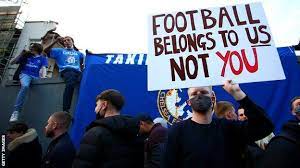European Super League sparks controversy across Europe

Photo used with permission from Google Commons
Football fans in Europe protested wildly against the Super League and the agenda of the club owners.
The footballing world fell apart on Apr. 18 when news of a European Super League was announced. Twelve of Europe’s biggest clubs from England, Spain and Italy announced that they would be banding together to form their own breakaway competition from UEFA, which left fans in smithereens. The idea was immediately branded as a plot of pure greed from the owners of these 12 clubs, and an elitist, twisted version of the sport that they love.
The format of the Super League is as follows: The 12 “founding clubs” would invite three more “founding clubs,” and the other five spots of the league would be invited from across the continent. The 15 “founding clubs” would be permanent members of the league, meaning that no matter how poorly a “founding club” performed, they would still be able to participate in the league. This eliminates the possibility of relegation, which is a key part of European Football, and without it, there would be no real consequence for losing. Coaches, fans and players all disagreed with this, and Manchester City Coach Pep Guardiola said that “it’s not a sport when success is guaranteed.”
Secondly, the 12 founding clubs are supposed to be given $400 million “welcome packages” by American bank JP Morgan, which is considered by fans to be the main reason the owners of these clubs are so interested in the Super League to begin with. Due to the COVID-19 pandemic, all of these clubs lost hundreds of millions of dollars and found themselves in debt.
This Super League is considered to be a “quick fix” for that issue. Fans consider this to be the signs of corporate greed creeping into football, and FIFA and UEFA threatened to ban players who participated in the Super League from participating in traditional tournaments like the World Cup and the Champions League, as well as domestic leagues. Sophomore Ted Otengo said, “I don’t like the format of the Super League as I think it will ruin soccer/football in Europe. It neglects all the small teams that have aspiring dreams to be great and it will allow the big teams to qualify every year despite their position in the league, and to make it worse, the owners of these clubs are just doing it for the money.”
However, a few days later, the English Clubs that were a part of the Super League decided to pull out of it after protests from their fans. PE teacher Anthony Pykosh was delighted with this, saying, “I disagree with having them put together a league and not have players play for their countries in the World Cup. Secondly, it’s all based on greed, and if they’re not getting the blessing of FIFA and UEFA, then it’s wrong. The fans don’t want it, the players don’t want it, and I’m happy they stood up to the owners, and I’m happy the owners listened to the fans and players, and despite it all, I respect the owners for respecting the fans and pulling out of the league.”
Your donation will support the student journalists of Thomas S. Wootton High School. Your contribution will allow us to purchase equipment and cover our annual website hosting costs.
Simon Kidane is a 2022 graduate.






